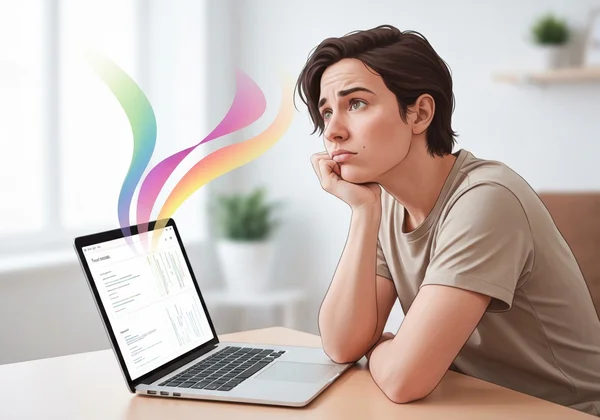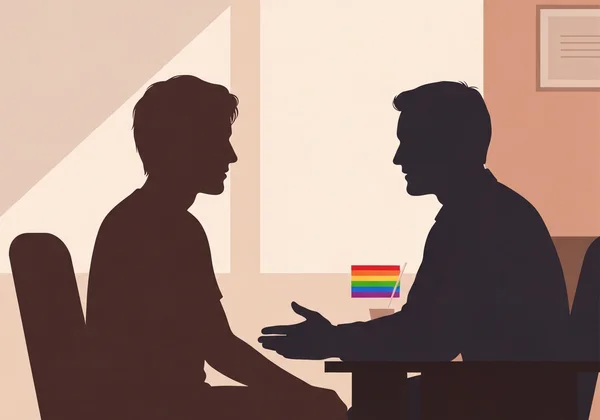Kinsey Scale Test Anxiety: Navigating Identity Confusion
November 20, 2025 | By Alex Rivera
Taking the Kinsey Scale test is often a deeply personal and illuminating step on the path of self-discovery. It can offer a sense of clarity, validation, and belonging. But for many, the results can also open a door to unexpected feelings of confusion, uncertainty, or even anxiety. What if my results from the Kinsey Scale test left me more confused than ever? If you find yourself in this space, please know you are not alone. This guide is here to offer a compassionate roadmap for navigating these complex emotions, reminding you that your journey of understanding is valid, personal, and perfectly paced. Your exploration of self is a courageous act, and it's okay to feel overwhelmed. You can always begin your exploration whenever you feel ready.
Understanding Post-Test Feelings: Why You Might Feel Confused About Sexuality
It’s completely normal to feel a swirl of emotions after receiving your Kinsey Scale score. The expectation is often for a single, clear-cut answer, but identity is rarely that simple. This feeling of being confused about sexuality is a common and understandable part of the process. Instead of seeing confusion as a setback, we can reframe it as an invitation to explore your identity more deeply, free from rigid expectations.
Normalizing Confusion: It's a Spectrum, Not a Label
A primary source of confusion comes from a misunderstanding of the scale's purpose. Alfred Kinsey designed the scale to demonstrate that sexuality exists on a continuum, not in two opposing categories. Your score is not a permanent, unchangeable label; it is a snapshot of your feelings and experiences at a particular point in time. The very concept of the scale highlights the fluidity of attraction. People can and do move along this spectrum throughout their lives. Seeing a number that doesn't perfectly match your internal narrative can be jarring, but it simply means your experience is nuanced—and that is beautifully human.
The Pressure of Definition: Moving Beyond Binary Expectations
We live in a world that often demands simple definitions. From a young age, many of us are exposed to a binary understanding of sexuality: you are either heterosexual or homosexual. When your results place you somewhere in the middle—or even at an end you didn't anticipate—it can clash with these ingrained societal expectations. This dissonance is a major driver of anxiety. The Kinsey Scale challenges this binary, suggesting a reality that is far more diverse and complex. Embracing this complexity can be liberating, but it requires unlearning years of social conditioning, a process that naturally comes with a period of adjustment and confusion.

Coping with Kinsey Scale Anxiety: Practical Self-Compassion Strategies
If you're experiencing Kinsey Scale anxiety, the most powerful tool you have is self-compassion. Instead of judging your feelings, treat yourself with the same kindness and understanding you would offer a dear friend. Your journey is unique to you, and there is no right or wrong way to feel. Here are some practical strategies to ground yourself and nurture your emotional health.
Practicing Self-Kindness: Journaling, Mindfulness, and Affirmations
Taking time for structured self-care can significantly improve your emotional well-being. Consider starting a journal to freely write down your thoughts and feelings without fear of judgment. This can be one of the most effective self-reflection exercises, helping you untangle complex emotions. Mindfulness practices, such as deep breathing or a 5-minute meditation, can calm an anxious mind and bring you into the present moment. Finally, positive affirmations can help rewire negative thought patterns. Try repeating phrases like, "My journey is valid," "I embrace my authentic self," or "It is safe for me to explore my identity."

Giving Yourself Time: Identity as a Journey, Not a Destination
One of the greatest sources of anxiety is the feeling that you need to have it all figured out right now. Give yourself permission to be a work in progress. Identity is not a final destination you arrive at; it is a lifelong self-discovery journey. Your understanding of yourself will evolve as you have new experiences and gain new insights. Allow yourself the grace to simply exist in the "not knowing." This period of questioning is not a sign of failure but a vital part of your personal growth. Exploring your identity is a process, and tools like our Kinsey test are just one step along the way.
Beyond Your Score: When Questioning My Sexuality Leads to Growth
The act of questioning my sexuality can feel destabilizing, but it is also a profound opportunity for growth. It pushes you to look beyond external labels and connect with your true self on a deeper level. Your Kinsey Scale score is a piece of data, but you are the expert on your own life.
Connecting with Your Inner Self: Trusting Your Authentic Feelings
Your feelings, attractions, and experiences are the ultimate authority. Use your test results as a starting point for introspection, not a final verdict. Ask yourself: How do I feel when I'm around different people? What do my daydreams and fantasies tell me? What feels right and true in my heart? Learning to trust your intuition is a powerful skill. Your authentic self knows the way; the challenge is quieting the external noise long enough to listen to its wisdom.
Exploring Supportive Communities: Finding Your People
Navigating identity confusion can feel incredibly isolating, but countless others have walked this path before you. Seeking out community can be a transformative experience. Look for online forums, local LGBTQ+ centers, or social groups where you can connect with people who share similar questions and experiences. Hearing others' stories normalizes your own and provides a space where you can be open without fear of judgment. These shared experiences build resilience and remind you that you are part of a vast, diverse, and supportive community.

Finding Support: LGBTQ+ Mental Health Resources & Next Steps
While self-reflection and community are invaluable, sometimes you may need additional support. Prioritizing your mental health is a critical part of this journey, and there are many professional LGBTQ+ mental health resources available to help.
When to Seek Professional Help: Understanding Your Needs
If your anxiety or confusion feels overwhelming, impacts your daily life, or leads to feelings of depression or hopelessness, seeking professional guidance is a sign of strength. A therapist or counselor, especially one with experience in LGBTQ+ issues, can provide a safe, confidential space to explore your feelings. They can offer coping strategies and tools tailored to your unique needs, helping you navigate this period with greater clarity and confidence.
Reputable Organizations and Hotlines for LGBTQ+ Support
There are numerous non-profit organizations and hotlines dedicated to providing support for the LGBTQ+ community. These support systems are staffed by trained individuals who can offer immediate, confidential help if you are in crisis or just need someone to talk to. A simple online search for "LGBTQ+ support hotline" or "LGBTQ+ community center near me" can connect you with reputable resources in your area. Remember, reaching out for help is a brave and important step. Your well-being matters most.

Your Journey Forward
Your journey after taking the Kinsey Scale test is uniquely yours. Feelings of confusion and anxiety are not indicators that you've done something wrong; they are signs that you are engaging in the deep, meaningful work of self-discovery. Treat yourself with radical self-compassion, give yourself the gift of time, and trust your authentic feelings. Remember that your score is a guide, not a final definition. Here, we are dedicated to supporting your exploration every step of the way. Continue to learn, grow, and embrace the beautiful complexity of who you are. When you're ready, we invite you to continue your journey on our platform.
Frequently Asked Questions After Your Kinsey Test
What does it mean if I'm still confused about my sexuality after the test?
It's completely normal and very common. The test is a tool for reflection, not a diagnostic machine. Confusion often means you're moving beyond simple labels and embracing the true, nuanced spectrum of human attraction. See it as an open door to further self-exploration, not a closed one.
Is it normal to feel anxious after taking the Kinsey Scale test?
Yes, absolutely. The results can challenge long-held beliefs about yourself and your place in the world. This can naturally trigger anxiety. Be gentle with yourself, use the coping strategies mentioned above, and remember that these feelings will ease with time and self-reflection.
When should I seek professional help for LGBTQ+ mental health concerns?
If your feelings of anxiety, stress, or confusion are persistent, interfere with your ability to function in daily life (work, school, relationships), or if you're experiencing symptoms of depression, it is a great time to seek professional support. A therapist can provide invaluable tools and a safe space to process your journey. You can always explore the spectrum with our resources while considering your options.
Does my Kinsey Scale score define me permanently?
No, it does not. Your score is a reflection of your experiences and feelings at one moment in time. Sexuality can be fluid, and your position on the scale may shift over your lifetime. The most important thing is to honor how you feel right now, knowing that your identity is an evolving part of you.